Many thanks to the Duke-UNFCC Climate Change Negotiation Practicum that I was exposed to a historic climate change conference (COP 25) in Madrid, Spain from Dec 3 to Dec 6, 2019. These four days flew like hours where we got lots of experience and networking opportunities. I am very glad to note that I came out of the conference meeting my expectations as I outlined in my pre-conference blog post.

A massive conference
I found the COP 25 so massive in that 10 of the Giga halls in the convention center were full handling several negotiations and side events per day and every hour. A number of these halls were having more than 20 conference rooms effectively managing over 20k conference participants in various forms of groups of countries including the observers and media.
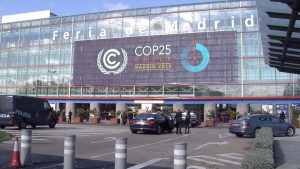 The COP 25 Conference center in Madrid, Spain
The COP 25 Conference center in Madrid, Spain
As such, one has to be strategic to get the most out of this massive conference. For me, I identified and stick with negotiations and side events related to the Warsaw International Mechanism for Loss and Damage. I chose this topic because it is related to my background and master project on the global refugee crisis.
Intense negotiation
In my stay, I have witnessed tough negotiations being conducted among groups of countries. From the coordination meetings such as that of G77 and China, Africa, and the LDCs group, I learned that these blocks have to first come up with a common goal before sitting with negotiating parties, mainly the developed world. At times, coming to in agreement within own group becomes challenging and time taking due to different interests within a group.
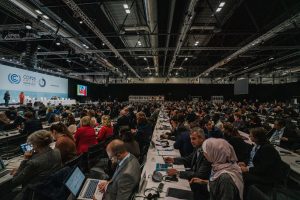 Plenary session at the main conference center”: Baker
Plenary session at the main conference center”: Baker
Blogging
As a part of the fulfillment of the practicum, we were asked to report back in the form of blog posts on the course website. This gave me a good opportunity to experience how it feels like a journalist. It also prompted me to organize interview sessions with a couple of prominent negotiators for the Warsaw International Mechanism for Loss and Damage as well as from the Civil Society side and my country delegation. One of the interviews is already up while the others are pending.
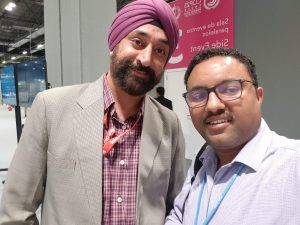 With Harjeet Singh, Global Lead on Climate Change, ActionAid
With Harjeet Singh, Global Lead on Climate Change, ActionAid
Ethiopian Delegation
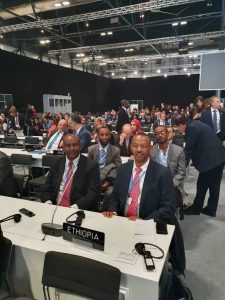 During the period, I participated in the conference as a part of the Ethiopian delegation that gave me unrestricted access to most of the events. The team is composed of excellent experts from various institutions such as the Ministry of Environment, Forest and Climate Change, and the Ministry of Agriculture. I did long interviews and conversations with the team lead and other members regarding the opportunities and challenges faced by the team. I was told that energetic, and experienced team members are among the strengths of the team while staff turnover and budget limitation as major constraints to fully participate in the conference and negotiation events.
During the period, I participated in the conference as a part of the Ethiopian delegation that gave me unrestricted access to most of the events. The team is composed of excellent experts from various institutions such as the Ministry of Environment, Forest and Climate Change, and the Ministry of Agriculture. I did long interviews and conversations with the team lead and other members regarding the opportunities and challenges faced by the team. I was told that energetic, and experienced team members are among the strengths of the team while staff turnover and budget limitation as major constraints to fully participate in the conference and negotiation events.
Networking
I also spent time networking with the previous members of Ethiopian delegation who have got long years of experience in negotiation and serving the current delegation in different capacities. We discussed how their experience evolved over time. They stressed that continuing to attend the conference in the future is important to understand the process and support our country in a meaningful manner.
To this end, I would like to thank the course administrators, the Ethiopian delegation and the people I met at the conference who made my stay at COP 25 rewarding.
Yared Lemma Hurisa, Rotary Peace Fellow,
MIDP, Sanford Public Policy School, Duke University

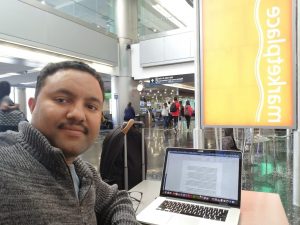 I got this incredible opportunity of attending the UN Climate Change Conference (COP 25) in Madrid through the Duke UN Climate Change Negotiation Practicum. The course provided us an excellent foundation about the UN Climate Change regimes and main negotiation blocks. I was attending this course along with extremely dynamic cohort of students from different departments at Duke. The course is run by high ranking professors and guest lecturers.
I got this incredible opportunity of attending the UN Climate Change Conference (COP 25) in Madrid through the Duke UN Climate Change Negotiation Practicum. The course provided us an excellent foundation about the UN Climate Change regimes and main negotiation blocks. I was attending this course along with extremely dynamic cohort of students from different departments at Duke. The course is run by high ranking professors and guest lecturers.